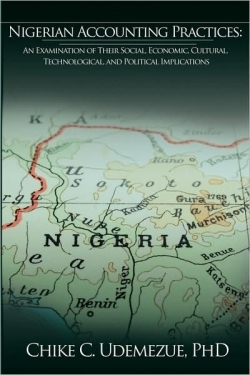Nigerian Accounting Practices
An Examination of Their Social, Economic, Cultural, Technological, and Political Implications
Accountants, those responsible for audits, inspections, and maintenance of financial accounts for public offices and private businesses, are bound by a code of ethics and must adhere to principles within their profession to ensure that finances are managed with integrity. This five chapter volume details the methods used, and results of a study on the business accounting practices in Nigeria. One of the primary concerns of the study was to identify to whom accountants in the country tend to give their primary allegiance.
Chapter one introduces the background, purpose, and significance of accounting practices in the country, followed by a brief history of Nigeria, research questions used for the study, its limitations, and implications for change. Chapter two introduces and discusses the research literature. Chapter three explains the research methods, including population samples, data analysis, validity, reliability and more. Chapters four and five describe the study findings, conclusions, recommendations, ending with a summary.
Nigerian born, Dr. Chike Udemezue is a chartered accountant with special interests in retention strategy, labor markets, and resource management.
Approximately 102 business accounts were polled in the city of Lagos, with 100 percent participation. Study results demonstrate that accountant job satisfaction in contemporary Nigeria is based on several factors: personal values, family affiliations, and religious inclinations, all of which may influence ethical conduct and professionalism regardless of professional ethics. Readers may draw a parallel between the misuse of collective resources in developing countries as a factor in their ability to maintain economic stability. Individuals who, above all, hold public welfare in utmost regard have a direct impact on their economy. Each chapter concludes with a summary and reference list which makes it easier to match sources with content; though bibliographic formatting is inconsistent (i.e., not all page references are included).
While the content is no doubt useful, Nigerian Accounting Practices is not a leisure read. This book would be useful for university students studying accounting, finance, or international business. The information is presented in a professional, easy to understand manner and the author writes with an authoritative tone.
Reviewed by
Angela Black
Disclosure: This article is not an endorsement, but a review. The publisher of this book provided free copies of the book and paid a small fee to have their book reviewed by a professional reviewer. Foreword Reviews and Clarion Reviews make no guarantee that the publisher will receive a positive review. Foreword Magazine, Inc. is disclosing this in accordance with the Federal Trade Commission’s 16 CFR, Part 255.

